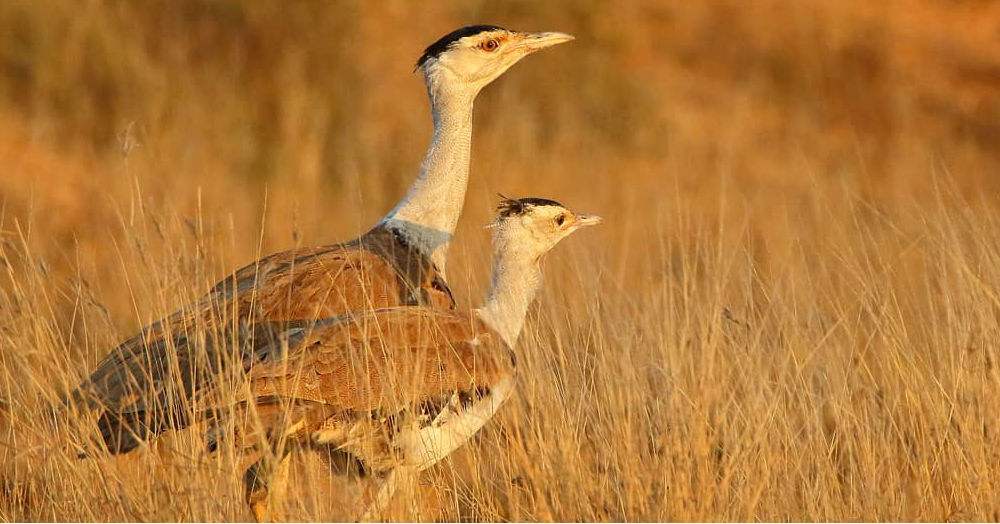
Earlier this year, we lost one of Africa’s most iconic animals. Sudan, the last ever northern white rhino, passed away in Kenya. He was the only surviving male of his species in the world. The other surviving members of his family are female and hence, no natural procreation of the species is possible.
Image source: Twitter
We managed to eradicate an entire species from the face of this earth due to rampant poaching and unchecked development. We thought we may never see another situation like Sudan at least in our lifetime, with the increase in awareness and social outcry. We could not be more wrong.
In India, we are facing a similar crisis. Another species is on the verge of extinction and there is hardly anything being done to save it. With its pale neck and brownish-grey wings, the Great Indian Bustard, or the GIB as it is also called, is hard to spot, camouflaged with the murky dry landscape it is found in. If you spot it, make sure to take a good hard look at it. You may not even see the GIB on your next visit to Gujarat or Rajasthan.
What’s In A Name?
Image source: Instagram
The Great Indian Bustard was once in the running to become India’s national bird. However, our founding fathers feared that its name would be confused with the word ‘bastard.’ The peacock was chosen in its place, and the rest is history.
India’s First Major Extinction In The Making
Luck has a lot to do with the GIB, and the birds have not been dealt good fortune cards over the last 50 years or so. Once found from the far reaches of north-west India to the fertile plains of Bengal, less than 150 GIBs exist in the world today. The birds are native to the plains of India and exist nowhere else in the world. Losing this handful of GIBs would mean pushing an entire species towards extinction as early as 2020 – which would mark India’s first major loss of a species since independence.
How Did We Get Here?
Image source: Instagram
The World Wildlife Fund (WWF) in India lists hunting as the biggest threat to the bird. Another big reason is the birds’ collisions with high tension electric wires. The Wildlife Institute of India estimates that about 18 GIBs die every year due to collision with high tension electric wires. That is nearly a tenth of their population each year.
Poaching outside protected areas, fast-moving vehicles and free-ranging dogs in villages are also threatening the species. Other threats include habitat loss and alteration as a result of widespread agricultural expansion and mechanised farming.
The bird was present in 11 states about 50 years ago. Today, the GIB, with an average weight of 15-18 kilograms, among the heaviest of flying birds—barely survives. A few of its habitats remain in Rajasthan (where it is the state bird), Gujarat, Maharashtra and Karnataka. In a sorry state of affairs, Maharashtra has just one bird remaining.
Why Is Conservation Important?
The GIB is unique to India, like the Royal Bengal tiger and the Gir lions. The conservation of a wildlife species is a critical part of a nation’s development and ability to sustain growth without the destruction of nature.
According to the Wildlife Institute of India, in case of the GIB, any rapid increase in population through breeding is also a challenge. The bird mates just once a year. Hence, the need to protect them is imperative.
Other Endangered Animals In India
Image source: Instagram
1. Asiatic Lion
The king of the jungle is an endangered species in India. Just over 200 exist in the wild right now.
2. Ganges River Dolphin
Direct killing, habitat destruction by dams and barrages and indiscriminate fishing have led to a direct decline in the number of river dolphins in India.
3. Royal Bengal Tiger
The national animal of India is still a target of poaching and it has led to critically endangering it.
4. Greater One-Horned Rhino
This is another animal that’s a target of poaching even inside protected zones. Hunters often target them for their horns, which is sold illegally for medicinal purposes.
What Is Being Done To Help The Bustard?
Over the last few years, government-sanctioned conservations have not enjoyed great success in protecting the GIB. This prompted Sanctuary Asia and The Corbett Foundation and Conservation India to join hands to start a public outcry to protect the GIB. It is running an online petition, apart from a mass public campaign, to urge the government to take immediate action – especially, in the removal of overhead electric wires in the GIB’s natural habitats.
Pioneers like Cara Tejpal – a wildlife conservationist and Sanctuary Asia’s Young Naturalist 2012 winner – are also doing their bit to support the cause.
“I can not bring myself to sit back when we are witnessing the first major extinction that Independent India will see,” Cara wrote on her Instagram account. “I fear what it will say about us as a people if we allow the GIB to slip into oblivion.”
How You Can Help?
Image source: Instagram
You can do your bit by going to Conservation India’s website and signing the petition to reduce and remove the overhead high-tension wires in the GIB habitats.
You can also support people like Cara and the other organisations by spreading the word online and amongst people you know. Else, come 2020, the Great Indian Bustard would just be another relic in a museum, joining the White Rhino and the Dodo.
Featured Image: Instagram
POPxo is now available in six languages: English, Hindi, Tamil, Telugu, Marathi and Bangla.
AWESOME NEWS! POPxo SHOP is now Open! Get 25% off on all the super fun mugs, phone covers, cushions, laptop sleeves, and more! Use coupon code POPXOFIRST. Online shopping for women never looked better!